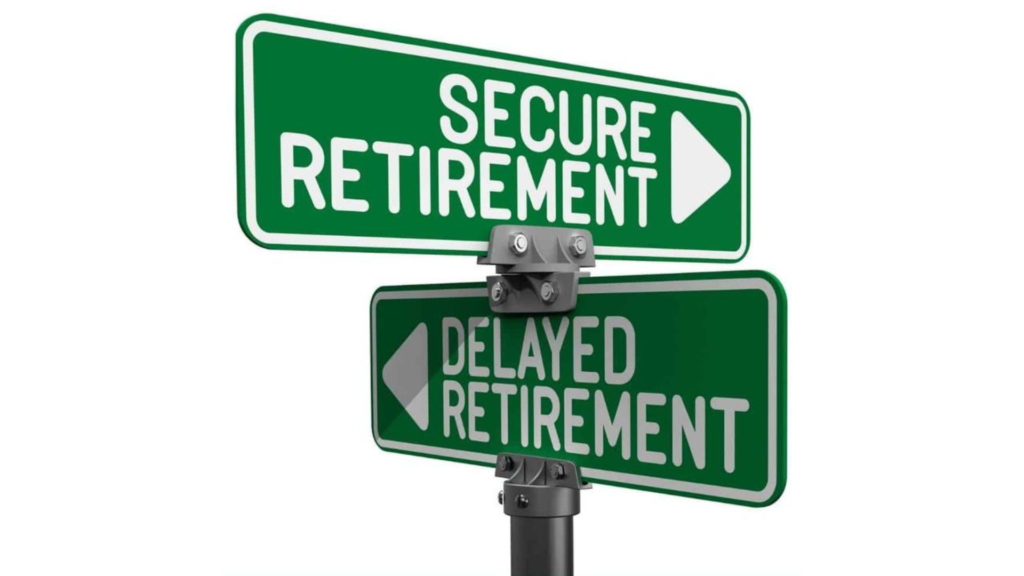Many believe delaying their retirement and working a few more years can help salvage their retirement savings. Even though working a few years longer can increase your financial security to some extent, it’s not always the best move to make, and besides, things could go wrong.
We all know that life is unpredictable, and workers who plan to make this move may not be able to work into their late 60s or early 70s. Unexpected circumstances like health issues or layoffs can force an early exit from the workforce, making it risky to rely on an extended career to make up for poor savings.
Now, let’s discuss why delaying retirement might not fully rescue your retirement savings and what you can do to prepare for a financially secure retirement.
Unplanned Early Retirement: A Common Reality for Workers
When planning for retirement, it’s easy to think you can keep working for a few more years if your retirement savings account doesn’t meet your goal. However, studies show that Americans often stop working earlier than anticipated and don’t retire on their terms.
According to EBRI’s 2023 Retirement Confidence Survey, one-third of workers said they expect to retire at 70 or older, or never, but only 6% of retirees did. This suggests that many retirees leave the workforce earlier than expected due to health problems, job loss, or the need to care for a family member. This unplanned early retirement is one of the most significant risks for those counting on working longer to boost their retirement savings.

Also, health problems can lead to forced early retirement. The possibility of falling victim to chronic conditions, surgeries, and disability rises with age. Even if you feel fit now, unexpected health challenges can suddenly disrupt your plans to extend your working years.
The job market is another factor beyond your control. Technological advancements and corporate restructuring can all lead to layoffs, especially for older workers.
Also, re-entering the workforce in your 50s or 60s can be difficult, with age discrimination and limited opportunities becoming setbacks. Unplanned early retirement can drastically reduce the time available to build your retirement savings, leaving you less financially secure as you age.
ALSO READ: Researchers Find That 79% of Americans Who Take This Step Won’t Run Out of Money in Retirement
The Myth of a Nonexistent “Escape Valve“
For many Americans, the idea of extending your working years seems like an easy “escape valve” to make up for poor savings. But the reality is more complicated than that. While working longer can be helpful, it doesn’t guarantee that your financial problems will be resolved.
As you get older, your ability to make a significant salary could decline even if you remain in the workforce. Older workers sometimes face pay cuts, reduced hours, or transfers to less taxing jobs with lower compensation. This can significantly reduce the expected boost to your retirement savings during those additional years of work.

It’s also important to understand that delaying retirement doesn’t stop the rising costs of necessities like healthcare, housing, and daily living. Healthcare, especially, often rises dramatically as you get older, which puts further strain on your retirement savings.
So, even though working more years may boost your income temporarily, you can still experience financial difficulties when you eventually retire. Nonetheless, having a realistic plan for your retirement savings instead of relying on the uncertain future is crucial.
The Upside of Staying in the Workforce Longer
While delaying retirement has disadvantages, it also has advantages. Working longer can incredibly boost your retirement savings account, allow you to maximize your Social Security benefits, and keep you active and focused. However, these advantages work best when incorporated into a more comprehensive financial plan.
Below are some of the benefits of staying in the workforce longer.
Maximizing Social Security Benefits
If you wait until after your full retirement age (which ranges from 66 to 67 for most people), your Social Security benefits will increase by roughly 8% for each year you delay, until you reach 70 years old. This can significantly boost your monthly income in retirement and can help make up for any gaps in your retirement savings.

Continued Contributions to Retirement Plans
Remaining in the workforce allows you to keep making contributions to retirement accounts like 401(k)s and IRAs. Also, depending on your retirement plan, this additional work time can help you save and boost your retirement savings significantly. Tax-deferred account contributions grow tax-free as well, allowing your investments to compound over a longer period of time.
ALSO READ: Retirement Experience Tips by Baby Boomers Who Live on $1,000 Monthly Social Security Benefits
Accurate Planning Projections for Retirement
If you’re not sure whether your current savings rate will be enough to support your retirement, a retirement savings calculator can help. These tools allow you to input your savings, expected retirement age, and estimated expenses to project how much you’ll need to retire comfortably.

Importance of Accurate Planning
Accurate retirement planning helps ensure you’re saving enough and aren’t taken by surprise in the future. Many calculators take into account factors like inflation, Social Security benefits, and the impact of working longer, giving you a clearer picture of your financial future.
With this knowledge, you can adjust your savings strategy, cut unnecessary spending, or decide whether it makes financial sense for you to continue working longer.
Building a Strong Retirement Plan Without Relying on Delayed Retirement
While working longer can offer some benefits, it’s foolish and risky to rely on it as the solution to your poor savings habits. It’s important to build a solid retirement plan early on instead of hoping that working a few more years will make up for any gaps.
The best way to avoid needing to work longer is to start saving for retirement as early as possible. If you’re thinking of the best retirement plans for young adults, they often include employer-sponsored 401(k) plans, traditional or Roth IRAs, and even brokerage accounts for long-term investments.

You can also prioritize consistent contributions to your retirement savings account and use tools like a retirement savings calculator. In the end, you’ll realize that securing your financial future all comes down to careful planning, disciplined saving habits, and creating multiple backup plans to deal with life’s unavoidable unforeseen turns.

